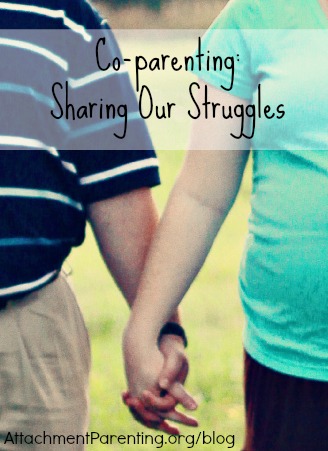Successful relationships require humility, that is, the ability to view our own wants and needs on a larger scale, which includes the wants and needs of others. As attachment parents, many of us know the importance of balancing our wants and needs with those of our child.
In marriage, this balance can be a bit more difficult, especially if our co-parent is not necessarily on the same page as us when it comes to parenting decisions. “They should know better” we argue, and too often lose our humility in dealing with adults. But, nobody is perfect.
When I first became an attachment parent, my husband didn’t immediately hop on board with all of the principles (and the resulting methods) that I was proposing we practice. And I must admit, the principles of attachment parenting and nonviolent communication didn’t quite carry over in the practice of my marriage.
Many times, I would tell my husband outright that his way of parenting was wrong, and that I was opposed to the way he was choosing to parent – the same way I had parented just months before. I pitted his actions against my philosophy.
What I failed to realize was this: While my parenting philosophy had changed, a change in my everyday parenting practices and reactions had yet to catch up. I had years of parenting beliefs and vices I needed to unlearn, and my husband was no different.
My arguing with him didn’t make him want to cooperate, but instead put him in a defensive mode. I wasn’t winning him over with this approach, that’s for sure!
What I was doing was the opposite of what I would want someone to do if I made a parenting mistake. I know I wouldn’t respond well if someone pointed out my every mistake in the heat of the moment. It almost always makes things worse.
I had my own parenting struggles, and he didn’t seem to respond to mine in the same manner. I realized what a hypocrite I was being.
Opening Communication
I decided to start showing some humility. Knowing that I still had my own parenting difficulties, I would share something I was struggling with, and ask for his advice.
It went something like this: “I really want to stop raising my voice at the kids, but it just seems to happen automatically when I’m frustrated. What do you think I should do?”
By humbling myself, they became “our” struggles, and we truly became partners on this parenting journey. Over time, once it became clear to him that I would no longer be singling out his behavior, he began to feel comfortable enough to open up to me about his own personal struggles.
Yes, it’s possible to feel connected to your partner even if you don’t share exactly the same views on parenting, and even if one of you has less visible struggles than the other. Some marriages require a bit more humility (read: balance) than others.
If you’re looking to open the lines of communication in your home, pick behaviors and issues that you both struggle with. Don’t single out something that only your spouse struggles with. Don’t use this as an opportunity to pick apart your spouse’s parenting. Be real. Be humble.
When we are humble, we can see that we are not “better” than other parents. We all have our hangups. We are all still learning and growing.
Tip: This also works with other family members and friends. And our kids!


Useful post! I have these issues w/my husband and I know I don’t handle them well but in the heat of the moment it’s hard.